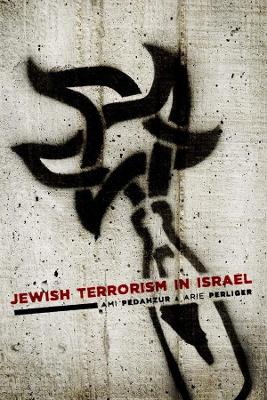Columbia Studies in Terrorism and Irregular Warfare
3 total works
In an unsettling time in American history, the outbreak of right-wing violence is among the most disturbing developments. In recent years, attacks originating from the far right of American politics have targeted religious and ethnic minorities, with a series of antigovernment militants, religious extremists, and lone-wolf mass shooters inspired by right-wing ideologies. The need to understand the nature and danger of far-right violence is greater than ever.
In American Zealots, Arie Perliger provides a wide-ranging and rigorously researched overview of right-wing domestic terrorism. He analyzes its historical roots, characteristics, tactics, rhetoric, and organization, assessing the current and future trajectory of the use of violence by the far right. Perliger draws on a comprehensive dataset of more than 5,000 attacks and their perpetrators from 1990 through 2017 in order to explore key trends in American right-wing terrorism. He describes the entire ideological spectrum of the American far right, including today’s white supremacists, antigovernment groups, and antiabortion fundamentalists, as well as the histories of the KKK, skinheads, and neo-Nazis. Based on these findings, Perliger suggests counterterrorism policies that can respond effectively to the far-right threat. A groundbreaking examination of violence spawned from right-wing ideologies, American Zealots is essential reading for everyone seeking to understand the transformation of domestic terrorism.
In American Zealots, Arie Perliger provides a wide-ranging and rigorously researched overview of right-wing domestic terrorism. He analyzes its historical roots, characteristics, tactics, rhetoric, and organization, assessing the current and future trajectory of the use of violence by the far right. Perliger draws on a comprehensive dataset of more than 5,000 attacks and their perpetrators from 1990 through 2017 in order to explore key trends in American right-wing terrorism. He describes the entire ideological spectrum of the American far right, including today’s white supremacists, antigovernment groups, and antiabortion fundamentalists, as well as the histories of the KKK, skinheads, and neo-Nazis. Based on these findings, Perliger suggests counterterrorism policies that can respond effectively to the far-right threat. A groundbreaking examination of violence spawned from right-wing ideologies, American Zealots is essential reading for everyone seeking to understand the transformation of domestic terrorism.
Ami Pedahzur and Arie Perliger, world experts on the study of terror and security, propose a theory of violence that contextualizes not only recent acts of terror but also instances of terrorism that stretch back centuries. Beginning with ancient Palestine and its encounters with Jewish terrorism, the authors analyze the social, political, and cultural factors that sponsor extreme violence, proving religious terrorism is not the fault of one faith, but flourishes within any counterculture that adheres to a totalistic ideology. When a totalistic community perceives an external threat, the connectivity of the group and the rhetoric of its leaders bolster the collective mindset of members, who respond with violence. In ancient times, the Jewish sicarii of Judea carried out stealth assassinations against their Roman occupiers. In the mid-twentieth century, to facilitate their independence, Jewish groups committed acts of terror against British soldiers and the Arab population in Palestine. More recently, Yigal Amir, a member of a Jewish terrorist cell, assassinated Yitzhak Rabin to express his opposition to the Oslo Peace Accords.
Conducting interviews with former Jewish terrorists, political and spiritual leaders, and law-enforcement officials, and culling information from rare documents and surveys of terrorist networks, Pedahzur and Perliger construct an extensive portrait of terrorist aggression, while also describing the conditions behind the modern rise of zealotry.
Conducting interviews with former Jewish terrorists, political and spiritual leaders, and law-enforcement officials, and culling information from rare documents and surveys of terrorist networks, Pedahzur and Perliger construct an extensive portrait of terrorist aggression, while also describing the conditions behind the modern rise of zealotry.
The Israeli Secret Services and the Struggle Against Terrorism
by Ami Pedahzur
Published 4 February 2009
While Mossad is known as one of the world's most successful terrorist-fighting organizations, the state of Israel has, more than once and on many levels, risked the lives of its agents and soldiers through unwise intelligence-based intervention. The elimination of Palestinian leaders and militants has not decreased the incidence of Palestinian terrorism, for example. In fact, these incidents have become more lethal than ever, and ample evidence suggests that the actions of Israeli intelligence have fueled terrorist activities across the globe. An expert on terror and political extremism, Ami Pedahzur argues that Israel's strict reliance on the elite units of the intelligence community is fundamentally flawed. A unique synthesis of memoir, academic research, and information gathered from print and online sources, Pedahzur's complex study explores this issue through Israel's past encounters with terrorists, specifically hostage rescue missions, the first and second wars in Lebanon, the challenges of the West Bank and Gaza, Palestinian terrorist groups, and Hezbollah.
He brings a rare transparency to Israel's counterterrorist activities, highlighting their successes and failures and the factors that have contributed to these results. From the foundations of this analysis, Pedahzur ultimately builds a strategy for future confrontation that will be relevant not only to Israel but also to other countries that have adopted Israel's intelligence-based model.
He brings a rare transparency to Israel's counterterrorist activities, highlighting their successes and failures and the factors that have contributed to these results. From the foundations of this analysis, Pedahzur ultimately builds a strategy for future confrontation that will be relevant not only to Israel but also to other countries that have adopted Israel's intelligence-based model.


